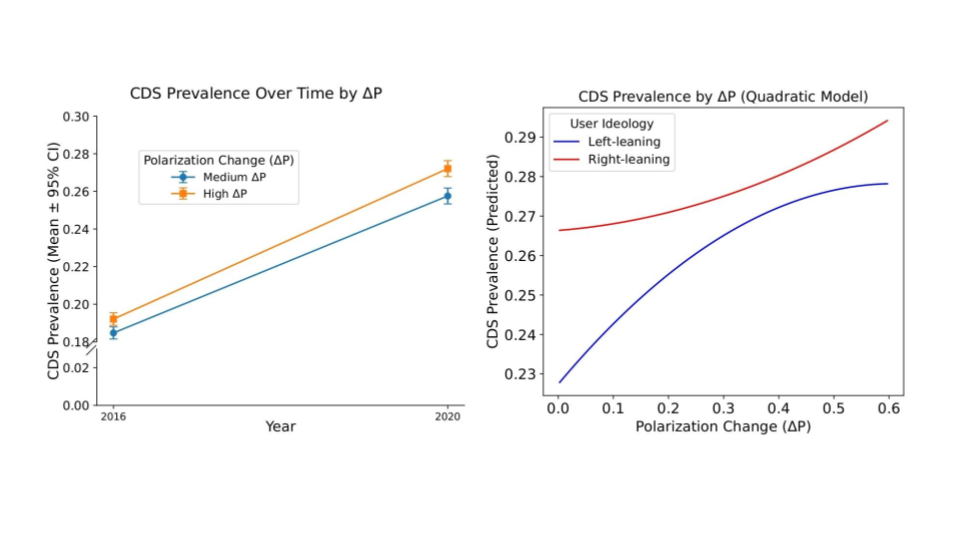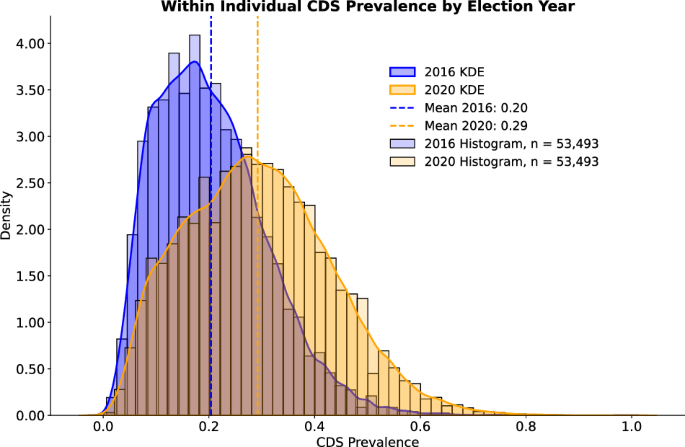Cognitive distortions are associated with increasing political polarization
Published in Computational Sciences and Behavioural Sciences & Psychology

From a Conference Dinner to a Paper on Polarization
The spark for this paper came during the 2023 Conference on Complex Systems in Salvador, Brazil. In a keynote talk by Johan Bollen, I learned two things that struck me: first, that social distortions might influence how we communicate online; and second, that there has been a measurable rise in linguistic patterns, called cognitive distortions, linked to psychological conditions like anxiety and depression.
The connection immediately resonated. Few months earlier, our team had published a study in Nature Human Behaviour on the rise of political polarization (https://www.nature.com/
Later that evening, over the usual conference dinner, I shared the idea with Andrew Edinger, a Ph.D. student in Johan’s lab. That conversation marked the beginning of a collaboration that would eventually become this paper.
Why are political conversations sounding more extreme — and more emotional?
If you’ve spent any time on social media during an election season, you’ve probably noticed a tone of harsh, black-and-white thinking. Opponents are described as “evil,” future outcomes are framed as disasters, and personal attacks abound. What if this wasn't just political heat — but something deeper?
In our new study, we show that the way people discuss politics online increasingly resembles patterns known as cognitive distortions — exaggerated, rigid ways of thinking often linked to depression and anxiety.
What are cognitive distortions?
Cognitive distortions are mental filters or biases that lead us to interpret the world in overly negative or extreme ways. They’re common in internalizing disorders like depression and anxiety, and they include patterns like:
· Catastrophizing (“Everything is going to fall apart”)
· Black-and-white thinking (“You’re either with us or against us”)
· Mind reading (“They all think I’m a failure”)
· Labeling (“They’re just evil”)
They simplify complex personal situations into emotional extremes — and that’s exactly what we’ve started seeing in political discourse as well.
Social media as a psychological mirror
To explore this, we analyzed 85 million tweets from the 2016 and 2020 U.S. mentioning presidential candidates. We looked for the presence of distortion-like phrases using a vetted set of language markers from cognitive behavioral therapy research previously developed by Bollen and his team.
The results were eye-opening:
· Distorted language increased by over 40% between the two elections, matching some of the results reported by Bollen and his team showing a sharp rise of cognitive distortions in recent decades.
· On average, users were 76% more likely to post tweets containing distortion markers in 2020 compared to 2016.
· This trend held across every major type of cognitive distortion — especially catastrophizing, emotional reasoning, overgeneralizing, and mind reading.
And these weren't just trends across the population. We saw the increase clearly within individuals, meaning people’s own language became more distorted over time.
Polarization and distorted thinking go hand in hand
But does this language shift relate to political ideology?
We estimated each user’s ideological leaning based on their retweets — a proven method for mapping political positions. Then we looked at how distorted thinking related to extremism and political shifts.
We find that users who became more polarized over time also increased their use of distorted language — especially on the left. That is not all. We even found signs that distorted thinking might precede increases in polarization, not just follow it.
Why does this matter?
This study doesn’t claim that political opinions cause mental illness — or vice versa. But it does suggest that the same psycho-social mechanisms that underlie mental distress may also be fueling the way we engage in politics.
In a world where online discussions increasingly shape public opinion, this is a crucial insight. It shows that polarization may not just be about facts and beliefs, but also about how we think — emotionally, cognitively, and socially.
And there may be ways to address it, leveraging techniques from Cognitive behavioral therapy, the gold standard treatment of depressions, which mitigate cognitive distortions.
Follow the Topic
-
Communications Psychology

An open-access journal from Nature Portfolio publishing high-quality research, reviews and commentary. The scope of the journal includes all of the psychological sciences.
Related Collections
With Collections, you can get published faster and increase your visibility.
Intensive Longitudinal Designs in Psychology
Publishing Model: Open Access
Deadline: Mar 31, 2026
Replication and generalization
Publishing Model: Open Access
Deadline: Dec 31, 2026



Please sign in or register for FREE
If you are a registered user on Research Communities by Springer Nature, please sign in